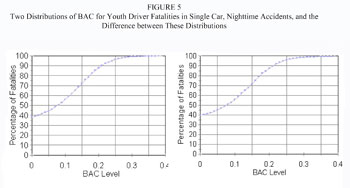Economist Challenges Zero Tolerance Laws
 In a time when the legal drinking age is being called to question by college chancellors and presidents across the country, a study by Sam Houston State University assistant professor of economics Darren Grant challenges another youth drinking-related law: the zero tolerance policy.
In a time when the legal drinking age is being called to question by college chancellors and presidents across the country, a study by Sam Houston State University assistant professor of economics Darren Grant challenges another youth drinking-related law: the zero tolerance policy.
The study’s title, “Dead on Arrival: Zero Tolerance Laws Don’t Work,” says it all: laws aimed at preventing minors from drinking and driving have absolutely no effect.
In his research, Grant analyzed nationwide data on nearly 30,000 fatalities in nighttime accidents involving drivers under 21, examining the number of accidents and the blood alcohol content of the drivers involved.
The original research used data on traffic fatalities from the department of transportation, data on laws and some other variables from all 50 states.
“The empirical work showed consistently that these laws had no effect,” Grant said. “If you look at the total number of accidents or the types of drinkers involved in these accidents, they just aren’t affected. Other factors matter, but not these laws.”
Zero tolerance laws became prevalent during the 1990s, when the U.S. Congress threatened to withhold highway funding from states that didn’t comply, according to Grant.
“The idea was, since drivers under 21 are not supposed to be drinking, you should be guilty of drunk driving if you are caught driving with any amount of alcohol in your system.”
Grant argues that the logic behind zero tolerance laws is “suspect,” as they don’t change the penalties for drunk driving, only the legal blood alcohol limit.
“It’s not making the penalty for drunk driving harsher,” he said. “It is just harder to satisfy the law. Drivers now have to give up drinking all together. It’s more exacting in that sense.
“Because you must sacrifice more to comply with the law, we should expect two responses: some people will comply and drink less, but others will just give up trying to satisfy the law and drink more,” he said. “So we should not assume a zero tolerance law will inevitably reduce drunk driving.”
Surprisingly, however, Grant found neither of these outcomes—that people drank more or less—occurred.
“I expected to see more heavy drinkers and also more non-drinkers, but I didn’t,” he said. “Instead, among drivers involved in traffic accidents, there is the same fraction of heavy drinkers, the same fraction of mild drinkers, the same fraction of nondrinkers. It’s just not changing.”
As part of the study, Grant compared the blood alcohol distribution two calendar years before and two calendar years after zero tolerance laws were established in each state. If a state passed the law in 1998, for example, he used the 1996 and 1997 data, as well as the 1999 and 2000 data.
 |
| Grant charted the percentage of youth driver fatalities by the blood alcohol content level from accident reports both two years before a state instituted its zero tolerance laws for minors (left) and two years after the laws were established (right). The result, that the two look identical, "just hits you right in the face," he said. |
What he found was when the information was mapped, or put in graph form, the maps look identical for both before and after the laws were enacted.
“It’s just amazing to see; you cannot tell them apart. That’s a sign that this law is essentially inert, because if it’s affecting the amount of drinking that people do, then these distributions should look different,” he said. “It just hits you right in the face.”
Data from fatalities were used because they are the only data collected in the U.S. that are “complete enough to do a study on each state over a period of several years on traffic outcomes is fatalities,” Grant said.
Grant’s colleague, Donald Freeman, who also chairs the economics and international business department, completed a similar study in 2007 on tightening drunk driving laws that yielded similar results. Freeman’s study stated that .08 laws were ineffectual.
Both studies extend earlier research on drunk driving laws in terms of the span of data studied and the techniques used to analyze the data. The negative conclusions of both studies, that the laws were ineffectual, result from the improved study design, Grant said.
“Some earlier work had concluded that zero tolerance laws worked, but when I read the studies, they did not focus on zero tolerance laws and didn’t, in fact, have particularly strong findings,” he said. “Given the importance and prevalence of these laws, a thorough and complete evaluation was needed, and that is what I have tried to do.”
By looking at the statistics using both the numbers of fatalities and the effect on the distribution of blood alcohol, Grant said his findings are more precise because they reinforce each other.
“One finding is that the fractions of heavy drinkers, mild drinkers, and nondrinkers in these accidents are unchanged; the other finding is that the total fatalities are also unchanged. If you’re able to get at something two different ways, it yields a more powerful conclusion,” he said.
“Dead on Arrival: Zero Tolerance Laws Don’t Work” will be published in the journal Economic Inquiry within the next year.
- END -
SHSU Media Contacts: Jennifer Gauntt
April 23, 2009
Please send comments, corrections, news tips to Today@Sam.edu
This page maintained by SHSU's Communications Office
Director: Bruce Erickson
Assistant Director: Julia May
Writer: Jennifer Gauntt
Located in the 115 Administration Building
Telephone: 936.294.1836; Fax: 936.294.1834
Please send comments, corrections, news tips to Today@Sam.edu.
- Undergrads Present Research
- Del Carmen Wins National Award
- Prof Chews On Geophagy Research
- April Recognized As Awareness Month
- CJ Honors Its Outstanding
- Center Hosts Awareness Activities
- President's Retirement Event Held
- Hooten Named Men's Basketball Coach
- Ring Ceremony Breaks Record
- Trip Takes Summer Classes West
- SHSU Receives First Patent Royalties
- 'Bone Lady' Gives 'Faculty' Lecture
- Seminar Gives Health Care Facts
- Research Clinic Benefits Children
- University Opens Regional Crime Lab
- Distinguished Educators Named
- Grad First Woman To Get Bar Award
- Week Prepares Students For Break
- Documentarian Gives Lectures
- Regents Approve Center Renovation
- Faculty, Staff Giving Breaks Records
- Events Celebrate Namesake, Texas
- Center Holds Financial Literacy Week
- SHSU Sends System To Afghanistan
- New Technology Aids In Fighting Crime
- Students Sought For Rural Internships
- SHSU Receives Incentive Check
- Musicians To Participate In Exchange
- Doctoral Program Earns Accreditation
- Class Recycles Sustainability Idea
- Week Prepares Students For V-Day
- SHSU Web Site Gets Redesign
- Fritz Named Head Football Coach
- Funds Donated For Center Renovation
- Center Establishes Mentorship Award
- Blatchley, Bamberg Are Grad Speakers
- H1N1 Vaccine Available For Students
- Regents Approve Tuition, Fee Increases
- Fifth Graders Get Science Lessons
- STAFS Provides Solutions In First Year
- Students Make Peanut Butter For Project
- Mentoring Program Helps CS Students
- Dean Offers Eating Tips For Students
- Four Named To COBA Hall Of Honor
- Water Treatment Technology Produced
- Rivalry Game Moving To Houston
SHSU 'In the News'
Brian Domitrovic, assistant professor of history, appeared on Book TV (C-SPAN) May 1-2, speaking about his recent book "Econoclasts: The Rebels Sparked the Supply Side Revolution and Restored American Prosperity" (www.econoclasts.net).
Houston Chronicle education writer Jeannie Kever recently turned to Regents Professor of English Paul Ruffin for his views on university presses moving toward "digital books" as opposed to traditional ink-on-paper."We're fulfilling the ancient role of the university press, and that is to produce books," said Paul Ruffin, the Texas poet laureate for 2009 and director of the Texas Review Press at Sam Houston State University. "I don't want to give up the book because it is an art."
Faculty/Staff Birthdays
Monday, May 3
Tuesday, May 4
Staff Council Spotlights
